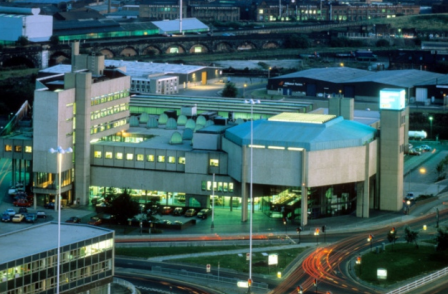
Former Yorkshire Post writer, Jill Parkin, salutes the paper’s old home, now being demolished
We knew the bulldozers were in, of course, but it was still a shock to us, my father and me, when we drove past the other day. “My bit’s still there, but yours has gone,” he remarked.
The editorial hall of the old Yorkshire Post building on Wellington Street in Leeds was vast, and divided down the middle into two kingdoms: the reflective morning journal of the broad acres and the breathless evening paper of our towns and cities.
What we had seen, almost suspended in mid-air, was the EP end, finishing in broken concrete and twisted cables roughly where the headphoned copytakers used to sit in a double row, typing stories round the clock.
The YP end was rubble on the ground, along with the library and its mezzanine floor, once full of bound copies of ancestral titles such as the Leeds Intelligencer and the Leeds Mercury. Just dust too, the offices of the two editors, where I was once given a triple gin – no tonic, that’s how it was in newspapers then – to soften the telling-off for accusing a posh restaurant in print of buying in its "home-baked" bread.
All buildings have their stories, of course, but newspaper offices have everyone’s stories. They came into that hall from Reuters, Press Association and the rest of the agencies worldwide in paper streams, which spewed out in the wire-room. They came in over phones, in letters and from the pub. They came in, above all, from reporters for whom new technology was turning your notebook over to use it again, backwards, who rang in from phone-boxes, praying they could get a copytaker before the deadline.

Yorkshire Post demolition: Credit BBC.
My father was working for the EP when the papers moved from the smoky, overwhelmingly male warren of Albion Street to the prize-winning Wellington Street building in 1970, where the working conditions were a new world.
It was big, not beautiful; newspapers then needed armies of people, writing, typesetting and selling advertising space. It seemed a strange place at first – too far out of the centre, no windows for the reporters to see the passing world, and a scaffold on wheels permanently there for light bulb changes because of its height.
Three of our family were to work there: father and two daughters.
Prince Charles opened it, politely saying nothing about carbuncles, and everyone came home with a commemorative mug. Black and white, like the papers’ old vans and like newsprint itself, it still sits unused on a shelf in my parents’ kitchen.
Then the concrete box started filling up with stories, local and national. Police corruption, Poulson and Kagan, the miners’ strike, Revie and Bremner, Lockerbie, Peter Sutcliffe, the Falklands War, Dewsbury going Tory, Piper Alpha, York Minster aflame, Hillsborough and Valley Parade, heroes and heroines, villainy and venality: all the stuff of human life.
News came in, and it thundered out. Newspapers were noisy places then. Manual typewriters clattered above and big personalities roamed the impersonal space. Egos and adrenalin ran high: there is no buzz like having a sub-editor whip your copy out of your typewriter paragraph by paragraph. And below, in the printing hall, were clanging and banging presses the size of houses, running off thousands of copies an hour in the days when provincial city newspapers could sell a third of a million.
In and among the multiple headline changes of every day were the building’s other stories. Legendary drinking sessions among editors and reporters alike, though none quite as epic as those in the Wakefield branch office; payments to prostitutes on expenses ("time not services") during the Ripper hunt; and printers selling bolts of cloth, one of their sidelines in the days when so many Leeds men still had tailors.
Outside there were printers shooting rats on the canal side from the car park during night shifts. And there was the journalists’ strike when the YPN chairman sent bottles of Scotch out to the reporters on picket duty around a brazier.
Such buildings do not show their memories when they are torn down; not like the slum clearances we could see in the West Riding when I was a child, bedroom wallpaper on view for the weekend, fireplaces, and curtains caught on broken glass.
Bulldozed concrete doesn’t speak of past love. All the same, this was a building packed with life – not just of those who worked there, but of those whose lives filled the columns every day. And for that, its dust deserves a nod of recognition.
Back home, I wondered if we should have a drink out of the mug to mark the building’s passing. No, said my father. “It’s not a thing of beauty, but I wouldn’t want to see it broken.”
Email pged@pressgazette.co.uk to point out mistakes, provide story tips or send in a letter for publication on our "Letters Page" blog






